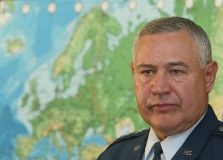U.S. urges Africans to protect Darfur aid workers
By Mark Trevelyan, Security Correspondent
STUTTGART, Germany, Aug 31 (Reuters) – The U.S. military is willing, if asked, to send transport planes to help relieve the humanitarian crisis in Sudan, but African nations must shoulder the job of providing security for aid workers on the ground, a top U.S. general said on Tuesday.
 General Charles Wald, deputy commander of U.S. European Command (EUCOM), also said Sudan’s government could rein in rampaging Arab militias in “about two seconds” if it had the political will.
General Charles Wald, deputy commander of U.S. European Command (EUCOM), also said Sudan’s government could rein in rampaging Arab militias in “about two seconds” if it had the political will.
“If called upon by our government to provide airlift, if we had the capacity we would do that,” Wald told Reuters in an interview at EUCOM headquarters in Stuttgart, Germany.
“Right now I don’t think it’s a matter of capacity so much for airlift support, I think that’s adequate,” Wald said.
“Right now what we need is the African Union to provide support and security for the humanitarian workers in the western Sudan, in the Darfur, so that food can be distributed properly.”
A deadline set by the international community for Sudan to halt a campaign of ethnic cleansing by Janjaweed Arab militias in Darfur or face possible U.N. sanctions expired on Monday.
The conflict has killed tens of thousands of people, displaced more than a million and left some two million in need of aid, in what the United Nations calls the world’s worst humanitarian disaster.
U.N. agencies said on Tuesday conditions were worsening for refugees in Darfur as the Sudanese government and rebels struggled to make headway in talks aiming to ease the conflict in the region.
The talks, in the Nigerian capital Abuja, have been bogged down by accusations of cease-fire violations on both sides.
POLITICAL WILL
In his comments, Wald said: “Certainly the Sudanese government in about two seconds could decide to rein in the Janjaweed and the other rebels. That can happen in a very easy way. It’s more of a political will issue.”
EUCOM’s area of responsibility covers 91 countries and territories including most of Africa. Though Sudan itself falls under U.S. Central Command, EUCOM is closely watching the situation there and has provided a liaison officer to the African Union to observe and offer advice.
Over the past-year it has also provided neighboring Chad with major security assistance, including counter-terrorism training.
Asked whose job it was to provide security for aid workers, Wald said: “We do consider that an African Union issue. There is an abundance of African military capability that could certainly do that job today. It’s a political will issue. We think the right thing is for the African Union to pick up this mission.”
Underlining the problems in Darfur, Sudanese officials said on Tuesday that rebels had kidnapped 22 volunteers who had joined a program to vaccinate people affected by the fighting.
The head of Sudan’s vaccination program and emergency operations office, Hassan Idriss, said rebels from the Justice and Equality Movement (JEM) abducted the volunteers on Sunday.
JEM officials were not immediately available to comment.
Wald said the Darfur crisis had the potential, if unchecked, to sow instability well beyond Sudan’s borders.
“The threat of thousands of people dying or being displaced, as they already are, has a potential for huge destabilization not just for Sudan but for the region itself,” he said.
